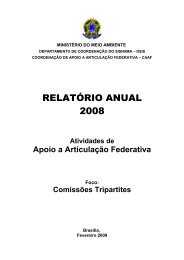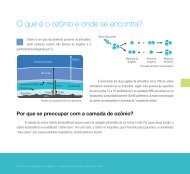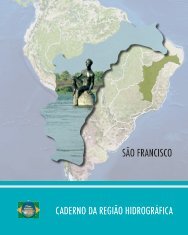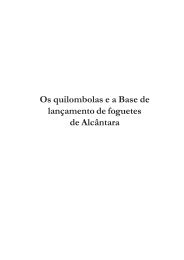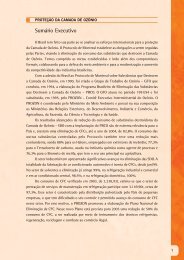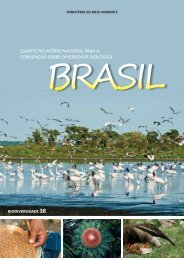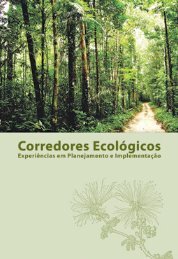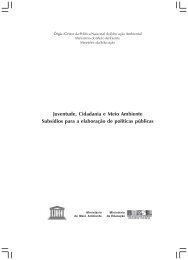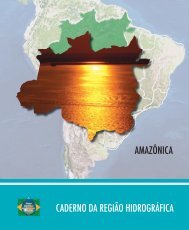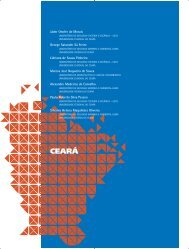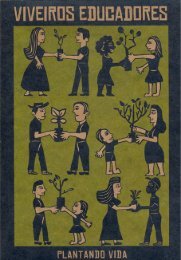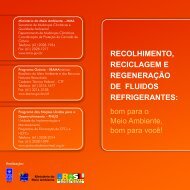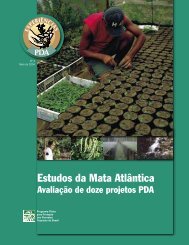Protected Areas
Protected Areas
Protected Areas
- No tags were found...
Create successful ePaper yourself
Turn your PDF publications into a flip-book with our unique Google optimized e-Paper software.
dissemination of exotic organisms.This Normative (Norma 20) aims atinternalizing the guidelines that aredetailed in the International Conventionfor the Control and Management of ShipsBallast Waters and Sediments, whichwas approved in February of 2004 andis currently being ratified by the BrazilianCongress. In October of 2005, the MMAcoordinated in Brasilia the First BrazilianSymposium on Invasive Exotic Species.The symposium counted with over 400participants from seven countries. InMay of 2006, during a commemorativesolemnity for the International Day forBiological Diversity, the Memorandumof Agreement with the Global InvasiveSpecies Programme (GISP) was signedby the Minister of the Environment, withthe objective of fostering a more effectiveprocess in the country for monitoringand controlling invasive exotic species.In the scope of the National Commissionon Biodiversity (CONABIO), in August of2006 the Permanent Technical Chamberon Invasive Exotic Species was created.In 2007, the MMA started the measuresto elaborate the National Strategy onInvasive Exotic Species and signed a Termof Cooperation between the Secretariatfor Water Resources and the Secretariatfor Biodiversity and Forests for surveyingthe invasive exotic species in the SãoFrancisco River basin.Finally, it is important to mention thatout of the concern for protecting theaquatic fauna a review of Ibama Decree145/98 was started in the scope of theNational Council for the Environment.This decree deals with the introduction,re-introduction and translocation of liveorganisms into aquatic environments.BiosafetyThe biosafety of genetically modifiedorganisms (GMO) includes variousactivities, as for example the participationof MMA representatives in the NationalTechnical Commission on Biosafety(Comissão Técnica Nacional deBiosegurança – CTNBio), the organizationof courses, participation in theelaboration of regulations, participationin international negotiations of themesincluded in the Cartagena Protocol onBiosafety, and others.By means of monthly CTNBio meetings,MMA representatives analyze anddiscuss processes pertaining to theconcession of Certificates of Quality inBiosafety (Certificados de Qualidadeem Biosegurança – CQBs), liberationof contained GMO for research(laboratories, bioterium, and vegetationhouses); planned release of GMO intothe environment for the purpose ofexperimentation and commerce, amongothers.The MMA organized and carried outfive capacity building courses on thebiosafety of GMO and their byproducts.The first three courses were carried outin 2004, in the states of Santa Catarina,Paraná and Mato Grosso do Sul andcounted on the participation of overthree hundred professionals, includingtechnicians, analysts and officersfrom the state and federal registry andlaw enforcement agencies, universityprofessors and technicians from otherinstitutions interested in the matter, aswell as farmers, and rural techniciansand leaderships. Each course wasone-week long and addressed topicspertaining to obtaining GMO, methodsfor identification, risk assessment,trackability and legislation, among others.The MMA also structured an internalCommission for the Biosafety ofGenetically Modified Organisms andbyproducts and their impact on the81



